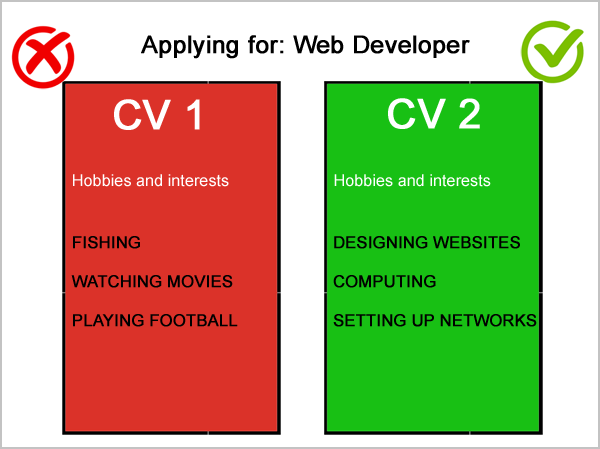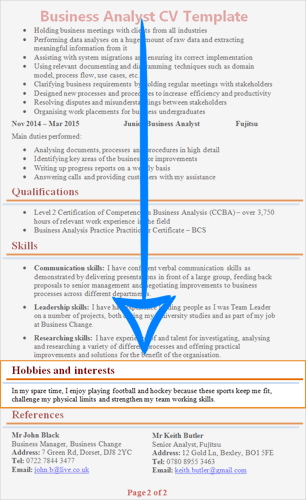 Sobhan Mohmand, Career Expert
Sobhan Mohmand, Career Expert  14 April 2023
14 April 2023
Putting hobbies and interests on your CV is a great way to make your CV stand out from the crowd and impress the employer.
What you spend your free time on tells the employer a great deal about you, your values, your motivations, and in some cases, your skills and intelligence. This information can add real value to your job application and improve your chances of being shortlisted for a job interview.
David Littleford et al., (2004) in their book Career Skills (pg. 14-15) mention under “other interests”:
“You should include hobbies and other interests, especially if they involve social and community activities. These activities are important – cover membership of societies, sports clubs/teams, etc. All these activities and the extent of your involvement give the recruiter clues about the real you and your interests.”
Use the guide and examples below to find out more about hobbies and interests and how to include them on your CV – let’s begin!

A hobby is an activity that you regularly pursue for enjoyment purposes, particularly during your leisure time. These are activities that generally relieve you from stress, tension or fatigue.
An interest is an activity that you want to do or are currently doing on an irregular basis.
The answer is, yes! Research has shown that adding relevant hobbies to your CV can make your CV more interesting, strengthen your job application and increase your chances of getting shortlisted for an interview. Putting your personal interests on your CV also shows the employer that you are a whole human being with a satisfactory life outside work and not a work robot.
If you lack work experience, your interests may show your suitability for the job in other ways. For example, they may give valuable information on your leadership potential or ability to work in a team.
Interviewers also use your interests to come up with ‘relaxing’ questions if the interview gets too hot or heavy; something which can help calm your nerves and improve your performance during the interview.
The benefits of including your personal interests on your CV:
Remember that your CV is your personal marketing tool, and you should make the most out of using the totality of your CV, including the interests section, to “sell yourself” to the prospective employer.
It’s not always appropriate to add this section to a senior CV. The more experience you have, the less important the hobbies and interests section becomes. Managers, executives and other experienced professionals are expected to show their skills and personal qualities from their work experience, achievements and educational background, without the need to resort to outside interests.
Phrases such as ‘Playing football’, ‘solving puzzles’, and ‘fixing computers’ are not generic terms without any meaning, rather; they carry a deeper message.
Here’s what the prospective employers will be subconsciously asking themselves when reading through the candidates’ CVs:
What do statements such as, “I play football on a regular basis”, “I enjoy solving puzzles” or “I like fixing computers” tell me about this candidate and their suitability for the job?
Many candidates do not realise that the hobbies and interests they include in their CVs can reveal a lot of information about them and their personalities.
Below is a list of some personal interests and activities and what they tell employers about the candidate:
| Hobby, interest or skill | What it reveals about the candidate |
|---|---|
| Computing | Is technical-minded and good with technology, may also be introverted |
| Swimming | Keeps fit and healthy |
| Solving puzzles | Has excellent problem-solving and analytical skills and likes to overcome challenges |
| Playing Football/Soccer | Has team-working skills; enjoys the company of other people |
| Playing chess | Is intelligent, a strategist and deliberates before taking action |
| Mentoring | Is a team player (rather than a loner), has good communication and interpersonal skills |
| Playing squash | Is highly competitive and motivated |
| Reading | Is intelligent, likes learning new things, is open-minded and analytical |
| Writing | Is creative with excellent written communication skills |
| Going to the gym | Is conscious of their health, is fit and motivated to accomplish goals |
| Travelling | Is outgoing, social and adventurous |
| Babysitting | Is good with children |
| DIY | Is practical and hands-on |
| Painting | Is creative |
| Taking part in charity work | Is socially conscious and has excellent influencing and persuasion skills |
| Making/decorating cakes | Has baking skills and an interest in food |
| Positions of responsibility | Is trusted by others, can take charge of tasks and has leadership potential |
| Helping at events | Good at dealing with the public |
Ask yourself: how do these interests add value to my application? Try to highlight your ability to interact, help and/or communicate with others.
Answer: Those that are relevant and add value to your application!
When deciding which interests to include, the golden rule to apply is;
Will it help me get the job?
Only include relevant hobbies, sports and leisure activities that display you in a positive light and strengthen your application; for example; interests which show that you are active, sociable and responsible.
Martin Yate, a best-selling careers author, outlines three broad categories of leisure activities to include on your CV in his book The Ultimate CV Book (Pg.35):
However, not every one of the above categories may be suitable for your situation and the job that you are applying for. Only select the hobbies and interests that are relevant to the job and add value to your application.
Example of relevant and irrelevant hobbies for a web developer:

NOTE: Different activities can be interpreted differently depending on the job you are applying for. For example, “playing computer games” as a hobby is irrelevant to most jobs and may sometimes portray you as a self-absorbed individual living in their own little cyber world. However, the same hobby can add tremendous weight to your CV if you apply for a job as a video game developer, graphics designer or shop assistant at your local games shop!
How to match your interests with the job you are applying for:
There are thousands of hobbies and interests that people include in their CVs. Selecting the correct hobbies to include will depend on a number of factors, including the job sector and the job role/specifications.
Use the guidelines below to select the correct interests for your CV:
For example, if the job holder must have “excellent people skills”, you could mention your volunteering, team sports or socialising activities – all of which develop your communication, interpersonal and people skills. Don’t mention playing chess or jogging as that would be irrelevant.
If, on the other hand, the job specification states that the person must possess “outstanding technical skills”, you would mention playing chess, building computers and upgrading computer networks – things that indicate that you are technically competent and analytical-minded. Don’t mention socialising events because that would be less relevant.
Many companies have a ‘culture’ in the way they operated and how employees of that organisation behave. Google, for instance, is now famously known for allowing employees to play games, take a walk or do sports in order to relieve stress or become more productive during working hours. When applying for a job at a company like Google, there is no harm in showing a little bit of your fun, playful and human side because that fits in nicely with their company culture.
It is always a good idea to write down the list of skills and abilities that you possess and see which of these would add value if you include it in your CV. Skills and abilities are closely related to your hobbies and interest; therefore, you may include them in this section too.
List of interests and their relevance to different jobs
| Hobby or interest | Relevance to job or industry |
|---|---|
| Coding and programming | Technology jobs |
| DIY | Manual workers; builders, contractors, plumbers |
| Writing and blogging | Journalists, copywriters and marketers |
| Sports | Jobs in sport; a coach or personal trainer |
| Elected leader of a society or club | Management and leadership positions |
| Cooking and baking | Jobs in the hospitality and catering industry |
| Organised a charity event | Events management |
Interests enhance your CV because they show the employer that you are an all-round person with a passion and determination to undertake activities outside work.
The following personal interests will make your CV shine:
These interests enhance your CV because they inform the employer that you possess excellent interpersonal, organisational and communication skills which enables you to undertake these activities. It also confirms that you are motivated and determined about the things you are passionate about.
The following hobbies will give a boost to your CV:
Below are the guidelines for writing a perfect hobbies section of your CV:
The interests section should be placed at the end of the second page, just before the CV references section:

Remember: This section is optional so placing it higher up on your CV will give the prospective employer the impression that you do not understand how to prioritise things. Think about it, how can your personal interests be more important to the employer than your work experience or qualifications?
Note: The example below is a bit long because the candidate had blank space in their CV and utilised it accordingly.


It is best to avoid putting anything controversial or sensitive on your CV. Humans are by their nature very judgemental, so be wise about what you disclose on your CV. For example, some recruiters may judge you negatively if you included heavy metal as your favourite music genre.
Avoid mentioning interests that could reveal your private beliefs.
Stating that you are an “active member of the local church” may harm your chances of being invited to an interview, especially when the potential employer reading your CV is a strict atheist. Similarly, stating that you “volunteered on a number of Labour election campaigns” or that you are a “huge fan of Manchester United” is also not a very good idea.
Don’t mention very risky, dangerous or time-consuming hobbies such as rock climbing, deep sea diving, bungee jumping, parachuting and boxing. It is in the employer’s best interest that you are fit and well when you’re working for them!
One recruitment expert commented, “Personally alarm bells go off for me when I read about people jumping out of perfectly good aircraft or hanging off tall buildings on the thinnest of ropes!”
Interviewers use the interests section of your CV to identify any conflict of interest if your hobbies demand too much of your time that could interfere with your ability to do your job or meet deadlines. A potential conflict of interest could arise, for example, if you state that you run two part-time businesses alongside your day job.
You may think it’s a good idea to make up some hobbies to impress the employer but this is not a good idea.
One unfortunate applicant had put ‘theatre’ as one of their interests but was left speechless and embarrassed at the interview when they were asked about the kind of theatre they liked and the name of the last play they saw.
Make sure that you know enough to talk about every interest you list on your CV at the interview. Don’t include “Karate” as your hobby if the nearest you ever got to karate was watching a martial arts film! What if the interviewer is a black belt and asks you about the style of karate you have studied?
Over the years, recruiters have documented the many weird and inappropriate interests that they have seen on CVs, including:
Needless to say, none of these candidates was invited for a job interview!
Adding too many hobbies to your CV fills up valuable space that could be used for more important information. The following is a sample of a CV’s interests section that contains too many activities:

At this stage, the prospective employer will most likely be wondering: “Gosh, when will this person have any time to do some work?!”
Putting hobbies and interests on your CV is an excellent way of enhancing your CV and improving the chances of being shortlisted for a job interview. Regardless of your job or industry, you should only include hobbies or interests that are relevant and add value to your application.
If you’re still undecided on what to include, have a look at the great examples below to see which of these you can add to your CV.
The best personal hobbies and interests to put on a CV: